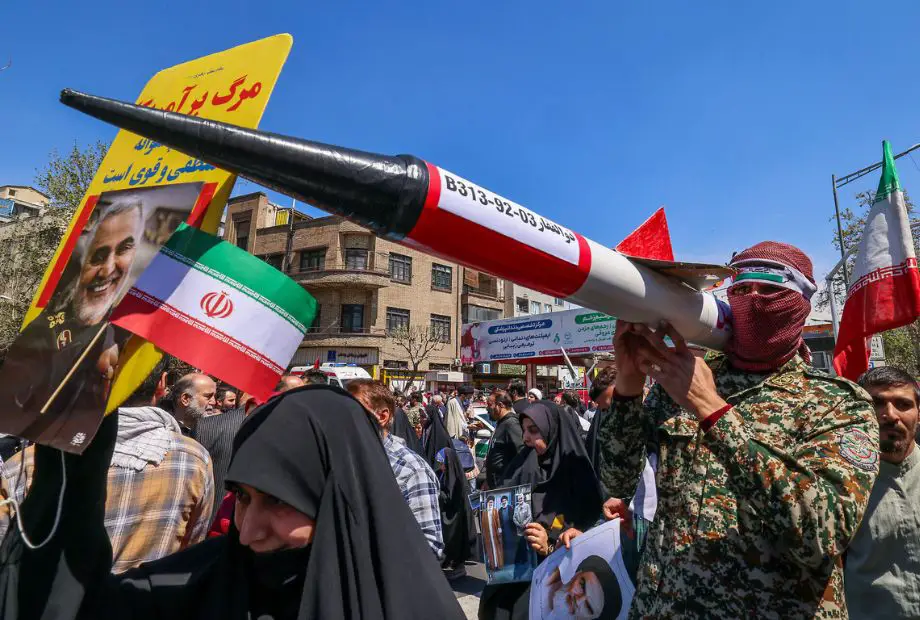US Intel Indicates Imminent Large-Scale Iranian Missile Attack on Israel
The US and its allies believe major missile or drone strikes by Iran or its proxies against military and government targets in Israel are imminent, in what would mark a significant turn of the six-month-old conflict, according to people familiar with the intelligence.
Follow Army Recognition on Google News at this link

Palestinian fighter showing a replica of Zolfagyar rocket recently delivered (Picture source Times of Israel )
According to an urgent report from Bloomberg, there is a high probability that Iran may target Israeli military or government sites either directly or through proxies like Hezbollah, using drones or high-precision missiles.
Today we know that since 2010, exchanges have taken place through Syria between Iran and Hezbollah. Several observers indicate that a significant number of missiles from the Shahab family, developed from the Soviet Scud missile with a range of about 500 km and a variable payload of about 1000 kilos, as well as missiles entirely developed by Iran from the Fateh family with a modest range of 500 km but a payload of 350 kg and greater precision. last arrived of the Fateh family is the Zolfaghar, a short-range ballistic missile developed by Iran alone. It is named after the legendary sword of Imam Ali and was first unveiled in 2016, and used for the first time in 2017, thanks to its name this missile is a symbol for the Mollah regime and Islamic fighters.
The Zolfaghar has a range of approximately 700 kilometers, allowing it to target locations throughout the Middle East, including many strategic sites in Israel.
The missile is capable of carrying a conventional warhead weighing up to 600 kilograms and is designed for high precision with reported improvements in accuracy due to enhanced guidance systems. This missile variant is part of the Fateh family and has been showcased in Iranian military parades, underscoring its role as a deterrent and offensive weapon in regional conflicts. These armaments enable Hezbollah to actively support a more significant Iranian action.
The backdrop of this alarming assessment includes a recent attack by Israel on the Iranian consulate in Syria, which resulted in the death of a high-ranking Hezbollah official. This action has drawn sharp responses, including a vow of revenge by Iran's Supreme Leader, Ayatollah Ali Khamenei, who equated the consulate attack to an assault on Iranian soil.
In a stark warning, Israel’s Foreign Minister Israel Katz stated on social media that any attack from Iranian territory would trigger a direct Israeli military response in Iran. This statement underscores the severity of the situation and the readiness of both nations to escalate their military engagements.
Complicating matters, the U.S. has expressed its unwavering support for Israel. During a recent statement, President Joe Biden emphasized America's "ironclad" commitment to Israel's security, highlighting international concerns over the potential for a broader conflict.
The situation is further aggravated by Iran’s support of actions against Israeli interests, including disruptions in the vital Red Sea shipping lanes by Iranian proxies, amidst Iran’s continued progress towards nuclear capabilities.
The available open-source images show that even the population, which was recently actively contesting the power, seems to support a military intervention towards Israel. However, Israel's allies and diplomatic friends are numerous, and they can count on long-standing reliable support, especially from the United States. Today, the Americans cannot lose this long-time ally in the Middle East, but especially due to the assistance agreements signed after the Yom Kippur War, they will be compelled to provide at least logistical support.
This confluence of military actions, retaliatory threats, and international diplomacy paints a grim picture of the current state of affairs. The international community watches closely, hoping for de-escalation options to prevail over the growing drumbeat of war.
Defense News April 2024


























